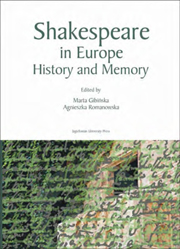Book contents
- Frontmatter
- Contents
- Preface
- Towards a European History of Henry V
- History and Histories
- History and Memory: Criticism and Reception
- “Strictly Ideal:” Shakespeare's Personality as a Historical Construct in Nathan Drake's Noontide Leisure
- Shylock and the Shrew: Victorian Shakespeare and Nineteenth-Century Spain
- “Memory of the Text.” Wyspiański's Hamlet
- “Happily they had no Choice:” Shakespeare's Elizabethan Audience and the Ideal of a Unified Cultural Sphere, C. 1920–1950
- History, Memory, and Ideological Appropriation
- Theatre: The Act of Memory and History in the Making
- Index of Authors
“Happily they had no Choice:” Shakespeare's Elizabethan Audience and the Ideal of a Unified Cultural Sphere, C. 1920–1950
from History and Memory: Criticism and Reception
Published online by Cambridge University Press: 05 September 2014
- Frontmatter
- Contents
- Preface
- Towards a European History of Henry V
- History and Histories
- History and Memory: Criticism and Reception
- “Strictly Ideal:” Shakespeare's Personality as a Historical Construct in Nathan Drake's Noontide Leisure
- Shylock and the Shrew: Victorian Shakespeare and Nineteenth-Century Spain
- “Memory of the Text.” Wyspiański's Hamlet
- “Happily they had no Choice:” Shakespeare's Elizabethan Audience and the Ideal of a Unified Cultural Sphere, C. 1920–1950
- History, Memory, and Ideological Appropriation
- Theatre: The Act of Memory and History in the Making
- Index of Authors
Summary
History is what a society chooses to remember. While the act of remembrance provides the continuity between past and present which is indispensable for a stable sense of identity, it is not concerned with similarities alone. The aspects in which the past differs from the present are of at least equal importance; not only because they provide a foil against which the present can define itself, but also because they offer an alternative to it. The past is not entirely another country, and if they did things differently there, chances are that things may be done differently again. Considered that way, history becomes a storehouse of options and a motor of change, for the inescapable fact of historical difference reveals the present order of things as a status quo. In a way, writing history always implies a critique of the present.
This goes for literary history as well, and for the strand of Shakespeare criticism concerned with situating the dramatist in his historical context: the “Bard” and his age often function as a counter-model to the time at which a critic is writing. One of the earliest instances of this is Thomas Upton (1707–1760, now best known for his edition of Spenser's Faerie Queene), who takes a clear stance against eighteenth-century notions of historical progress, and, in consequence, finds absolutely no necessity of defending Shakespeare's “faults” as the faults of a primitive age. Rather, he takes the fact that so many of his eighteenth-century contemporaries perceived them as such as indicative of their degeneration, and, more generally, of the downward development that, in his view, English culture has taken since the Restoration.
- Type
- Chapter
- Information
- Shakespeare in EuropeHistory and Memory, pp. 163 - 174Publisher: Jagiellonian University PressPrint publication year: 2008

